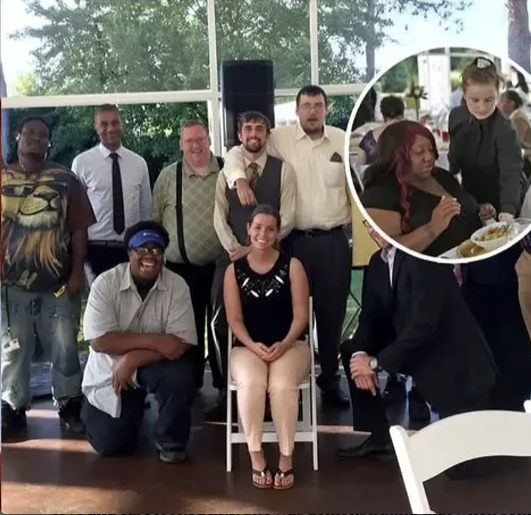
Sarah Cummins canceled her $30,000 wedding a week before the planned date. The kind of catastrophe that leaves you with deposits lost, food ordered, decorations prepared, a venue booked, and no celebration to use any of it for.
Most people would cut their losses, maybe try to get some money back, definitely spend the week grieving the relationship that ended and the future that wasn’t going to happen.
Sarah did something different.
Rather than waste all the food and decorations, she and her ex-fiancé transformed the reception into a free formal dinner for homeless people. The same menu and decor were used, and formal attire was donated for guests. They served dinner with family, turning what could have been disaster into compassion.
The photo shows the result—a white tent with tables and chairs, homeless guests seated and being served a formal meal. An inset shows a close-up of one attendee being served, receiving food on fine dishware, treated with the dignity and respect you’d expect at a wedding reception.
Attendee Charlie Allen called it an affirmation of dignity. Because that’s exactly what it was. These weren’t leftovers handed out in Styrofoam containers. This was a formal dinner, prepared for a wedding, served with care and respect to people who are often treated as invisible.
Sarah said the event helped her pull meaning from a disappointing situation. Which might be the understatement of the year. Her wedding collapsed a week before it was scheduled. She could have spiraled, could have let the loss consume her, could have spent the week angry at her ex-fiancé and devastated about her canceled future.
Instead, she took the resources she already had—the paid-for food, the reserved venue, the decorations and planning—and redirected them toward people who needed them. She transformed her personal disappointment into community service.
The decision to work with her ex-fiancé on this is particularly remarkable. When relationships end, especially right before a wedding, the usual response is to avoid each other, to process the grief separately, to definitely not plan a major event together. But Sarah and her ex-fiancé collaborated on this dinner, serving alongside family, creating something meaningful from the wreckage of their relationship.
That takes maturity. That takes being able to see past personal pain to recognize an opportunity to help others. That takes the kind of character that says “we may not be getting married, but we can still do something good with all these resources we’ve already committed.”
The homeless guests at that dinner probably didn’t know the full story. They probably just knew they were being invited to a formal dinner, told to dress nicely (with donated formal attire provided), and treated with unexpected respect and dignity.
Charlie Allen calling it an “affirmation of dignity” captures what made this special. Homeless people are used to charity that feels like charity—well-meaning but clearly marking them as “less than,” as recipients rather than guests. This dinner was different. Same food that was meant for wedding guests. Same decorations. Same formal setting. The only difference was who was being served.
That difference mattered. Because it communicated: you’re worth this. You deserve to be treated well. You belong at a table with nice dishes and decorations, eating food prepared with care.
Sarah could have donated the food to a shelter. Could have written off the loss. Could have done the minimum to salvage something from her canceled wedding. But she didn’t do the minimum—she created an entire event, coordinated with her ex-fiancé and family, served dinner herself, turned her personal disaster into someone else’s affirmation of dignity.
The photo shows diverse guests seated at tables under the white tent—different ages, different backgrounds, all receiving the same formal treatment. Some are eating, some are talking, all are being treated like valued guests at an important event.
Because that’s what they were. This wasn’t a consolation prize or a way to use up leftover resources. This was an intentional choice to honor people who are often dishonored, to serve people who usually serve themselves, to create beauty and dignity in an evening that could have been defined by loss.
Sarah said this event helped her pull meaning from disappointing situation. But it did more than that. It showed that disappointment doesn’t have to be the end of the story. That when plans fall apart, we get to choose what we do with the pieces. That sometimes the most meaningful thing we can do is take what was meant for our own celebration and give it to others instead.
Her wedding didn’t happen. But she created something more lasting than a wedding—a memory for dozens of homeless people who got to experience, for one evening, what it feels like to be treated with complete dignity. To sit at a formally set table. To eat food prepared with care. To be served by people who chose to honor them rather than pity them.
That’s not just making the best of a bad situation. That’s transformation. That’s turning personal loss into communal gain. That’s character revealed through crisis.